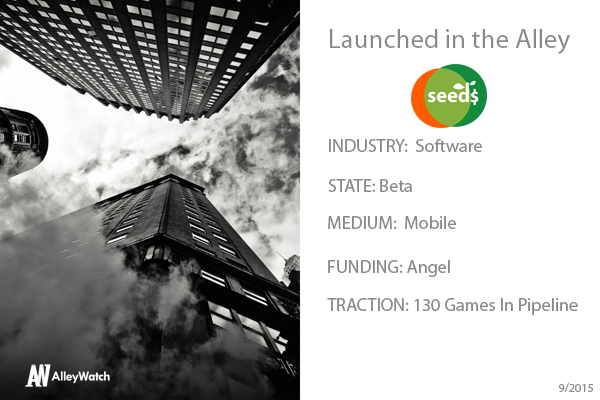You want your app to get big and you also want people to make in-app purchases. This startup may not help you get big, but it will definitely help get you guilt free in-app purchases! Seeds understands that by notifying users that they are not just giving their money to the company of the app, but that they are also generating micro-loans to entrepreneurs in developing countries, people will feel comfortable doing the world a service as well as help out your app.
Recently been into the Barclays Accelerator, Founder Rachel Kook, takes us through her company and how micro-loans can change our mobile gaming experience.
Tell us about the decision to apply for Barclays Accelerator.
We applied to various Techstars programs 4 times over a two and a half year period before finally gaining acceptance. We were finalists at least one other time that we know about. The stars aligned with this program, as there was a clear opportunity for Barclays to help us streamline the micro-finance portion of the Seeds product.
Tell us about your product or service.
Seeds helps game developers improve revenue, reach and retention through in-app purchases, the capital behind which we then channel to micro-entrepreneurs in the developing world, generating interest. We’ve found that a social good in-app purchase makes a non-paying gamer 58% more likely to spend her first dollar in a game. From there, she spends an average of $25, which is a big value-add to game developers.
How is it different?
For-profit social good is at the core of our business model, an oncoming trend that we believe will be huge, particularly with millennials. We think the practice of big corporations having Corporate Social Responsibility (CSR) departments, compartmentalizing their business activities and their philanthropic endeavors, will become increasingly obsolete.

What market are you attacking and how big is it?
Our revenue streams play in two markets: Mobile gaming and advertising is expected to be a $108 billion market by 2017. Global micro-finance is currently a $10 billion business.
What is the business model?
Seeds surfaces our product to non-paying gamers, letting a game know that we get paid if and only if we compel a player to spend her first $1. We keep 70 cents after the App Store takes their cut, and receive a revenue share on subsequent purchases. We then channel those funds into interest-bearing micro-loans through trusted MFI partners
What inspired you to start the company?
I’m a former Futures and Equities Trader who was career-profitable, but I wanted to flex my creative muscles more broadly, and I wanted to help people out. I was also very aware of the sexism within that industry, having been one of the only female traders everywhere I worked. I was living in Chicago, taking improv and comedy writing classes at Second City while trading the European shift at a proprietary trading shop, and I came upon an op-ed in The New York Times which focused on micro-finance and its ability to get capital in the hands of female entrepreneurs who were often unable to get traditional loans because of biases baked into the financial system. Women were statistically a more reliable investment, so there was a huge market inefficiency there, and the trader in me saw an opportunity.
The creative person in me was also keen to reach a larger audience that I was able to get when writing a comedy sketch, and so I had an epiphany – I decided to direct and produce a global feature film exploring micro-finance on four continents, even though I had no idea how to even get that off the ground. My team and I ended up filming in Kenya, and the sophistication of their mobile money transfer infrastructure was astounding. They had completely leapfrogged the developed world. I figured there was an opportunity to connect that infrastructure with other industries in the developed world, and landed on gaming. Gaming made sense because women spend money in games – the largest purchase of virtual gold in World of Warcraft, at that time, were women over 35 – women make micro-loans, and women use micro-capital most effectively. When we discovered that social good in-app purchases also compel greater spending behavior for both male and female gamers, everything came together.
What are the milestones that you plan to achieve within six months?
We’re currently beating a 10% w/o/w growth rate, and we’re working hard to continue that pace, scaling sales and marketing in the near-term. We will raise a substantial seed round to build out the business development and marketing teams post-Demo Day.
What is the one piece of business advice that you never got?
Do what feels authentic to you, and be relentlessly honest with others, but especially with yourself. I hated a lot of elements of the corporate culture I was once a part of, and the most toxic was the image-focused veneer I perceived there – it was as though we all felt that we had to appear to be a certain way, and that got in the way of sharing what was actually going on, and therefore solving problems more rapidly. On a more meta level, I think authenticity is the key to moving toward a truly happy, liberated life.
If you could be put in touch with one investor in the New York community who would it be and why?
I’m a big admirer of Fred and Joanne Wilson. I haven’t met Fred, but did have the pleasure of hanging out with Joanne a few months back, and she asked me to keep in touch as we progress. I hope this article reaches here. I dig what she does to support female founders.




